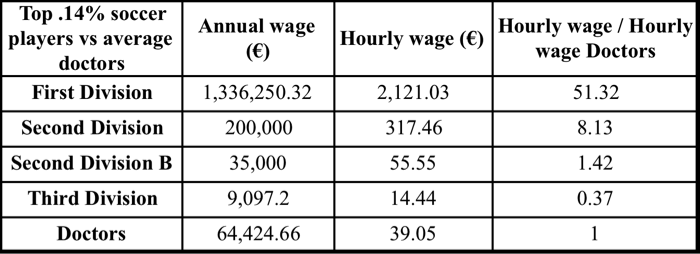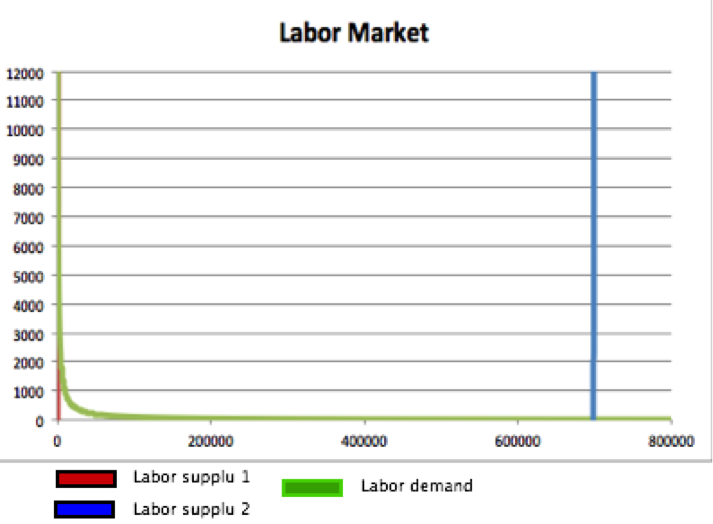Post by Nadim Elayan, current student in the Barcelona GSE’s Master Program in International Trade, Finance and Development. Follow him on Twitter @Nadim1306.
It is unethical that 20-year-old guys with no studies whatsoever earn 20 million euros a year by just kicking a ball during one hour and a half once a week whereas doctors who have studied almost an entire decade and save human lives every day earn 500 times less.
A fair society should compensate with higher wages people who save human lives than people that entertain us during the weekends.
How can we stand by watching soccer players earning millions a year while there are people starving in the same country?
Most of us will have probably heard these sentences or similar ones regarding the large wages that soccer players earn and even that this situation is immoral or a bad incentive for kids to have a good education. But is this true? Do soccer players actually earn more than doctors?
Before analyzing the Spanish soccer labor market or discussing the ethical implications of this situation we need first to say that this is not true. The fact that we can name some players with shockingly salaries it does not mean that on average soccer players earn more than doctors, or even more than the average salary of a specific country. In order to compare professions we need a non-biased sample. We cannot look at the best soccer player in the whole history, Lionel Messi, and compare his salary with a regular doctor in Barcelona and then conclude that soccer players earn 500 times more than doctors. This situation would be the same as looking at Yao Ming, a Chinese basketball player with a height of 7.6 feet (2.29 meters) and a weight of 310 pounds (141 kg) and wrongly concluding that Chinese people are 2 feet taller (0.6 meters) and they weigh 130 pounds (59 kg) more than the average European citizen. Thus Lionel Messi is not the best representative of soccer players’ earnings terms as Yao Ming is not the best representative of the Chinese citizen in physical terms.
In Spain there are more than 700,000 professional and amateur soccer players according to the Real Federación Española de Fútbol and most of them work without a salary or earning below the minimum wage and that is why most of them need another job. There are about 500 players earning on average a wage of 1,336,250.32€ a year, the ones playing in the First Division and also about 500 players earning a wage below 200,000€ on average, the ones playing in the Second Division[1]. So in total we can count that within Spain there are only around 1000 players earning a salary way above the salary an average doctor earns, which in Spain is 64,424.66€[2] on average.
We would have also to take into account that the soccer professional life is barely higher than 10 years while the doctor’s one would be around 35 to 40 years. All this without considering the high risk of injury a soccer player faces every day that would leave him without any salary at all the rest of his life. But of course on the other hand soccer players work no more than 15 hours a week on average and therefore the wage for this .14% gets even larger if calculated per hour. So in order to compensate for the differences in professional lives we should observe that soccer players would earn at least 3.5 to 4 times more than doctors.

We can see that these 1,000 players, .14% out of the total, earn way more than doctors on average but the next group of professional players who earn the most are the ones playing in 2nd B Division. There are 2,000 players in this Division earning on average 35,000€, what is actually less than doctors, but the hourly wage would still be above, 55.55€ per hour. If we go further away focusing in the ones playing in 3rd Division their hourly wage is 14.44€ already below the doctors one.
Summing up .14% out of total soccer players earn a salary way above the doctors’ average that more than compensates their shorter professional life. The next .28% still earns a higher hourly wage than doctors’ average but not enough to compensate their shorter professional life. So the rest 99.58% of the soccer players do not earn more than the average salary of a doctor. Actually most of them do not earn anything and some of them earn a little bit if they are in the starting line-up or for each victory.
Once showed that the average soccer player does not earn more than the average doctor, not even more than the minimum wage, we will analyze the soccer labor market and try to explain why this 0.14% earn so much money.
Analyzing the soccer labor market
First we will focus on the soccer labor demand. It is extremely high for very low values of labor hired, so for the first soccer players in the First Division and even for the Second Division. It is easy to show this by noticing that European societies are willing to fill 50 to 90 thousand people stadiums more than 30 times a year at prices between 20€ and 200€ per person each game. Therefore demand is huge. But for higher levels of labor hired, so 2nd Division B, 3rd Division and following Divisions the labor demand is very low and close to 0. Usually these games are free attendance or paying a type of mandatory lottery participation.

Now we can talk about the labor supply. In this case we can separate it into 2 subgroups. For simplicity we just divide the market in 2 subgroups, the first is composed by the 1000 soccer players playing in First or Second Division and the rest of the players. Even when considering perfect inelastic labor supplies we see very high wages for the first subgroup due to the high labor demand and also due to the very scarce labor supply of this type. Whereas for the second subgroup the wages are extremely low, almost 0, because of the low labor demand and the extremely high labor supply.
Ethical implications
People think constantly about soccer, they fill large stadiums paying really high prices and spend almost 100€ a year to buy the newest shirt of their team. Furthermore between 20 and 60 percent of total TV spectators watch Champions League games in prime time and even watch TV programs and listen radio programs that only talk about soccer… In conclusion people spend a large fraction of their income and time on soccer. Is it unethical that a large fraction of this cake is sent to workers via wages?
If we think that this 0.14% of total soccer players earn too much we should then say where we send this money generated by them. Would it be more ethical to let billionaire soccer teams owners to keep a larger fraction instead? In a non-profit Solow Economy, total output goes to capital and labor, therefore , high output will translate into high wages (for one club L=25, so very low). For example in F.C. Barcelona the season 2014-2015 has spent 509 million € in total and 288.9 million € of them only in players’ wages. So 56.76% of total expenditure goes to their soccer players[3].
Secondly if we speak about fairness we should want a society that creates only inequality from people who had the same life opportunities but they succeeded and managed to highlight in their respective fields and dislike inequalities coming from differences in opportunities. Since playing soccer is not expensive, all kids can play it everywhere and the best clubs, knowing this, have scouters all over the world. This makes this labor market pretty competitive, almost every kid at age 12 has at least tried once to get in F.C. Barcelona or Real Madrid through many tests these clubs organize everywhere. Thus, the kids who finally succeed must have been better than almost every kid of their age in the planet. All this combined make the differences in wages created be explained by differences in talent and effort no matter the race, family’s economic status or better education opportunities. In fact, most of the best soccer players like Pelé, Maradona, Ronaldinho, Cristiano Ronaldo, Samuel Eto’o, so also the ones earning high wages, come from very poor families.
Lastly the fact that there are people starving in a country has nothing to do with the fact that there are soccer players earning large wages because this is determined by a very large labor demand and a very scarce labor supply for this very specific First and Second Division players. The labor demand is determined by the society’s taste so we should blame this taste if we think that the amount of money generated by soccer is disproportionately huge and instead we should allocate this exact amount of time and income to fight hunger and other problems we find more relevant.
[1] Every team posts their wage budget annually. These values are obtained by dividing the total wage budget over the total players in that division.
[2] Source: OECD
[3] Source: fcbarcelona.com and Europa Press.
